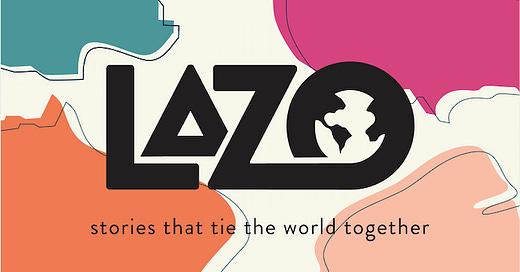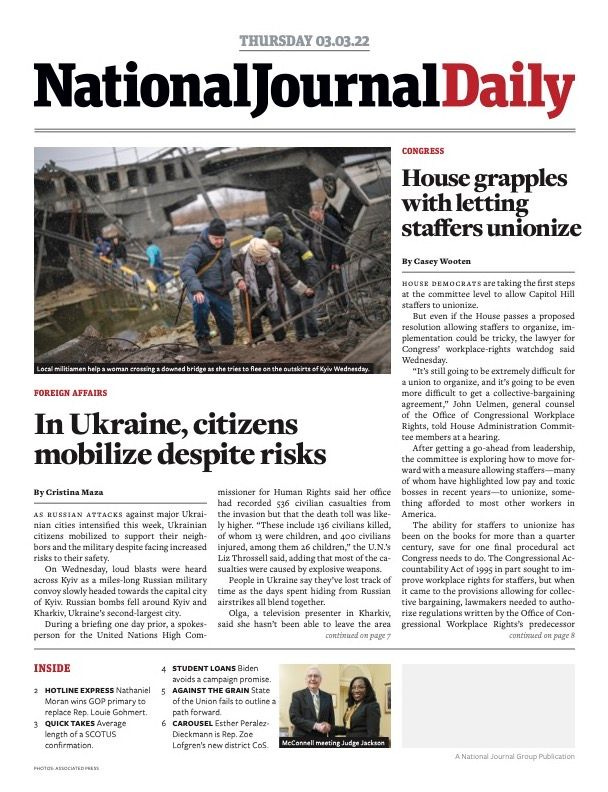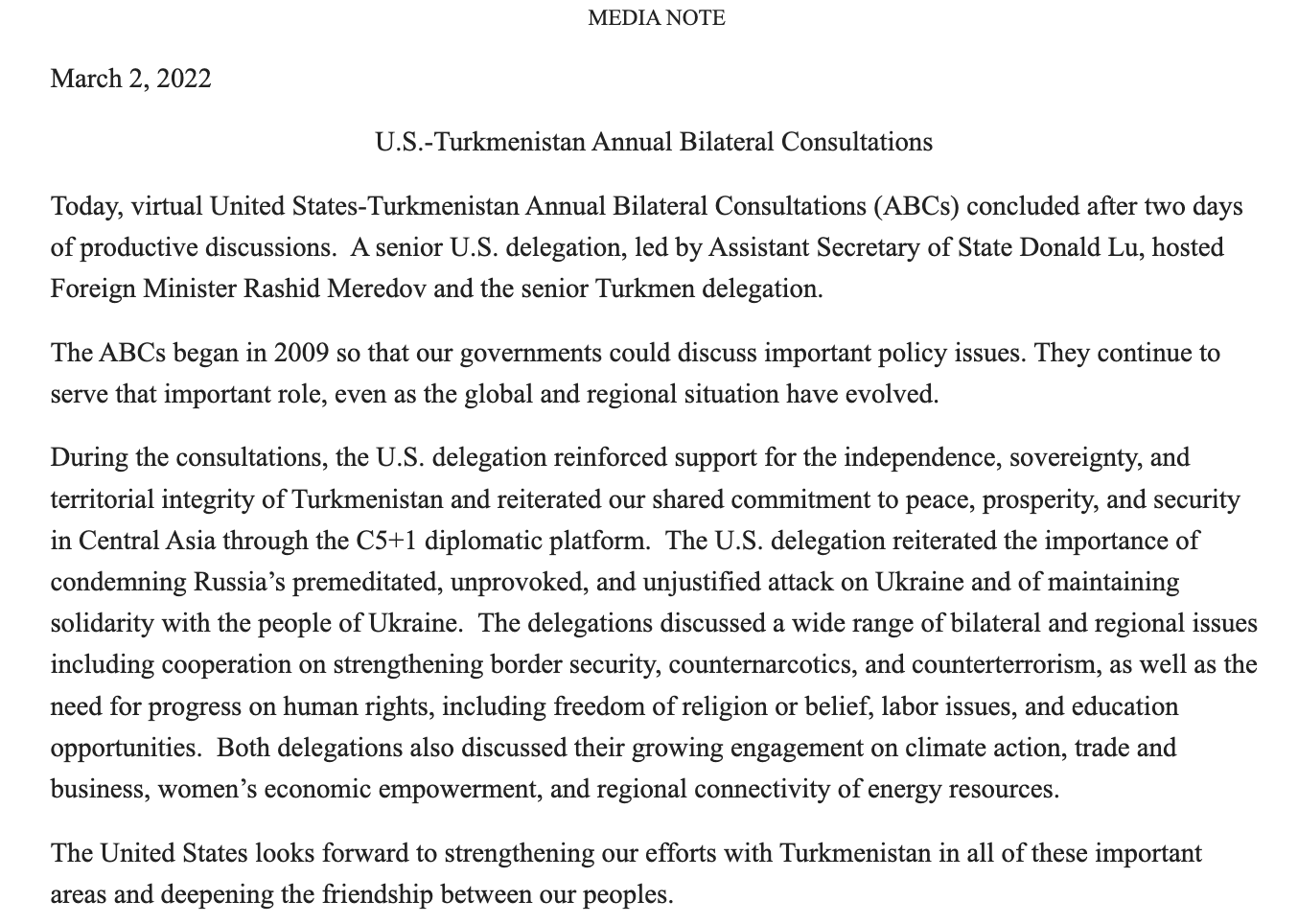Over 1 million people fled Ukraine in 1 week.
Here are some photos people sent me from Ukraine this week.


What I'm writing:
• Around 660,000 Ukrainians fled the country during the first six days after Russia’s brutal invasion. “It was really scary. We thought we would die in the crowd," one woman told me (This article is unlocked).
• I spoke to people staying in Ukraine and living under constant airstrikes (This article is unlocked).
• For National Journal's podcast Quorum Call on Tuesday, I recap what's happened in Ukraine so far.
What I'm reading:
• The Russian newspaper Novaya Gazeta's political editor Kirill Martynov wrote an essay in Russian and in Ukrainian arguing that the Kremlin has swallowed its own propaganda and dug Russia's grave. "Hatred will poison Russia's relations with all its neighbors, split families apart, destroy friendships...The blood of civilians will be on the hands of the aggressor," he writes.
• Putin signed a new law criminalizing the publication of “fake” news about the Russian armed forces and sanctions against Russia. Violators face up to 15 years in prison.
• Journalists from Russia's last independent news channels are fleeing the country, CNN reports.
• The International Criminal Court (ICC) is launching an investigation into the allegations of war crimes in Ukraine, NPR reports.
• Republican Senator Lindsey Graham put forward a resolution that would urge that Putin be investigated for war crimes, the Hill reports.
• Ukrainian President Volodymyr Zelensky survived at least three precision assassination attempts by elite hit squads since Russia’s war began, the Daily Beast reports.
• A Russian strike hit Freedom Square in the center of Kharkiv, the BBC reports. [Sources I spoke to in Kharkiv said the city is being razed to the ground.]
• Russian troops are in the southern Ukrainian port city of Kherson after forcing their way into the council building. The battle for control of Kherson, a shipbuilding center, left bodies strewn about the city streets, power outages, limited water, and little food, the New York Times reported.
• The key Ukrainian port city of Mariupol is “near to a humanitarian catastrophe,” the BBC reports.
• Russian troops entered the Ukrainian Black Sea port city of Mykolayiv for the first time, Reuters reports.
• Russian airstrikes killed at least 47 people in a residential district of the northern city of Chernihiv, the BBC reports. You can also see some horrific video footage of the city following the attack.
• World leaders accused Russia of endangering the safety of an entire continent after Russian forces shelled the Zaporizhzhia nuclear plant, the BBC reports.
• Ukraine's military has a higher share of women than most other armed forces in the world, VICE reports.
• Ukraine’s Defense Ministry asks the mothers of captured Russian troops to come pick up their sons, INSIDER reports.
• The European Union will finance the purchase and delivery of weapons to Ukraine for the first time, the Wall Street Journal reports.
• Ukraine will receive more Stinger and Javelin missiles from abroad, as well as another shipment of Turkish drones, the Guardian reports.
• The EU will ban state-owned Russian media outlets RT and Sputnik and their subsidies, Politico Europe reports.
• The EU froze the assets of Russia’s leading oligarchs, effective immediately. The individuals hit by the measures include Alfa Group's Mikhail Fridman and Petr Aven, Rosneft CEO Igor Sechin, Transneft CEO Nikolai Tokarev, and financier Alisher Usmanov, the Financial Times reports.
• The presidents of Estonia, Bulgaria, the Czech Republic, Latvia, Lithuania, Poland, Slovakia, and Slovenia published an open letter urging the European Union “to immediately grant Ukraine EU candidate country status and open the process of negotiations” for its acceptance into the bloc.
• Ukrainian President Volodymyr Zelensky asked the European Union to allow Ukraine to gain immediate membership as it defends itself from Russian forces, Reuters reports.
• The European Parliament adopted a resolution calling on the EU's institutions “to work towards granting” Ukraine the status of an EU candidate country, the Independent reports.
• The hacker collective Anonymous declared cyber war on Russia. It claimed credit for hacking the Russian Ministry of Defense database and is believed to have hacked multiple state TV channels to show pro-Ukraine content, the Guardian reports.
• Russian President Vladimir Putin put his nuclear deterrent forces on “high alert” in response to “aggressive comments” from “top officials in leading NATO countries," the Washington Post reports.
• A referendum in Belarus approved a new constitution that ends the country’s non-nuclear status, which paves the way for Russia to move nuclear weapons into the country, Reuters reports.
• Kyrgyz authorities detained the director of the NEXT television channel for airing a controversial report on an alleged agreement between Bishkek and Moscow to send troops to Ukraine to assist Russian armed forces in their ongoing invasion, Radio Free Europe reports.
• Turkey closed access to the Turkish Straits to the Black Sea and called on all sides of the war in Ukraine to respect the 1936 Montreux Convention, an international pact on passage through the Turkish straits, the Guardian reports.
• The United Arab Emirates suspended visa-free travel for Ukrainian tourists after abstaining from a UN Security Council resolution last week condemning the Russian invasion, the Wall Street Journal reports.
• Confidential documents, leaked from internal investigations, revealed that telecoms company Ericsson allegedly helped pay bribes to the Islamic State to continue doing business in Iraq after the terrorist group took over large parts of the country, the Guardian reports.
• Afghans will no longer be allowed to leave the country without good reason, and women will be barred from traveling without a chaperone, the Wall Street Journal reports.
• The World Bank approved a plan to use more than $1 billion from a frozen Afghan trust fund to finance urgently needed education, agriculture, health, and family programs, Al Jazeera reports.
• The head of the International Atomic Energy Association, Rafael Grossi, said that his trip on Saturday to Tehran could “pave the way” to reviving the 2015 Iran nuclear deal, Bloomberg reports.
• The Kuwaiti state is allegedly using an Interpol red notice to intimidate and harass Sheikha Moneera Fahad al-Sabah, a Kuwaiti princess seeking asylum in Bosnia-Herzegovina, and force the extradition of her partner, a prominent dissident blogger, the Guardian reports.
What the State Department says:
Upgrade to a premium subscription by Clicking Here.
You can also contact me for any reason by writing to c.maza@protonmail.com.












